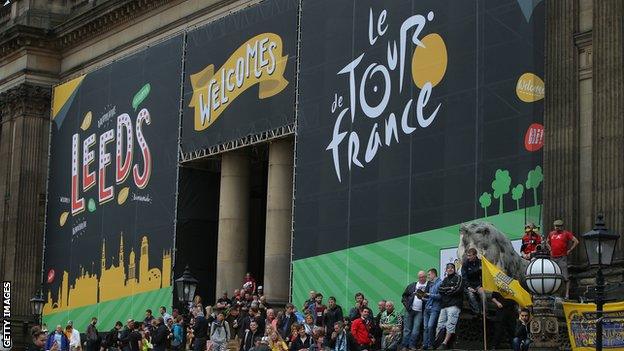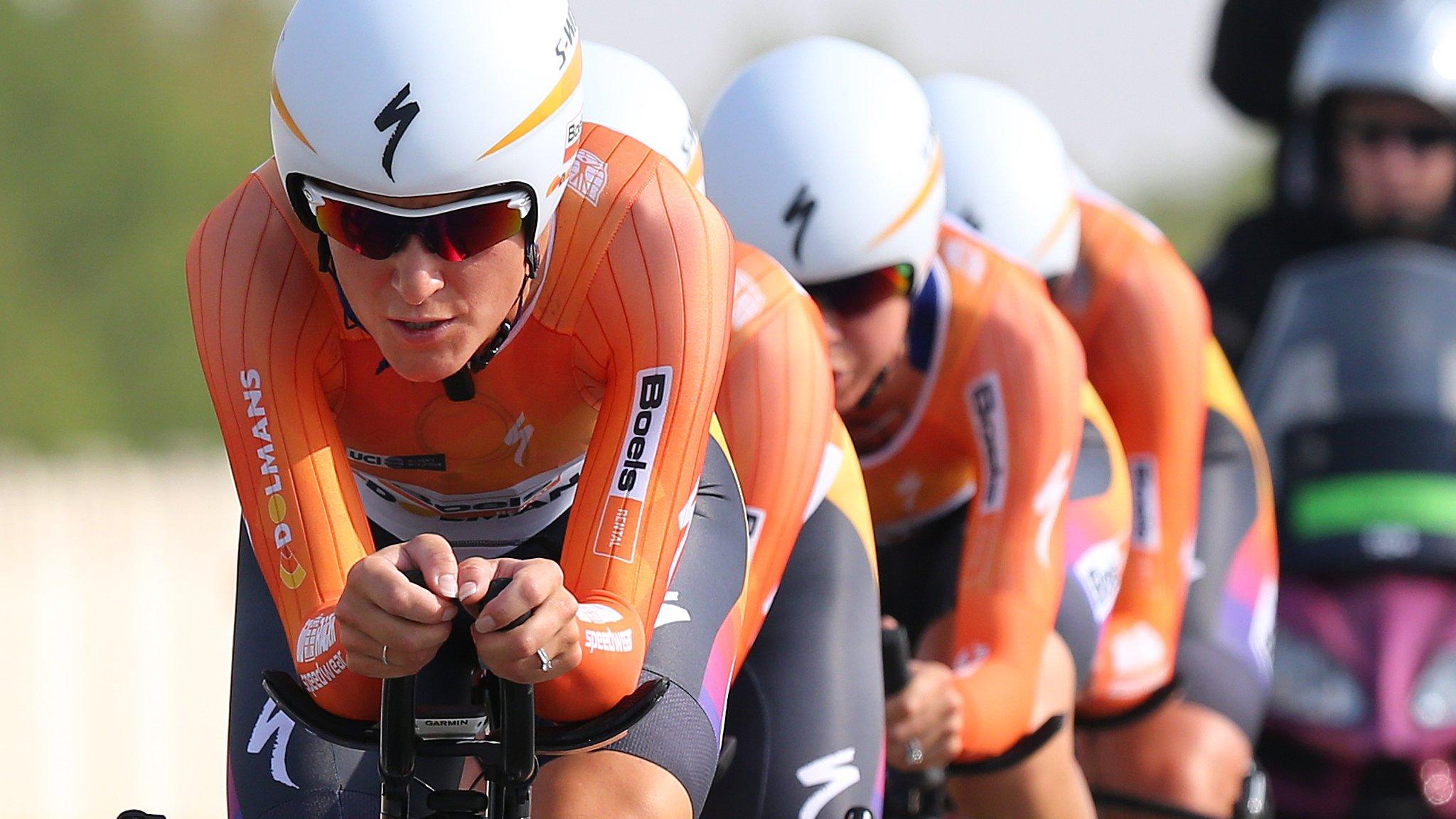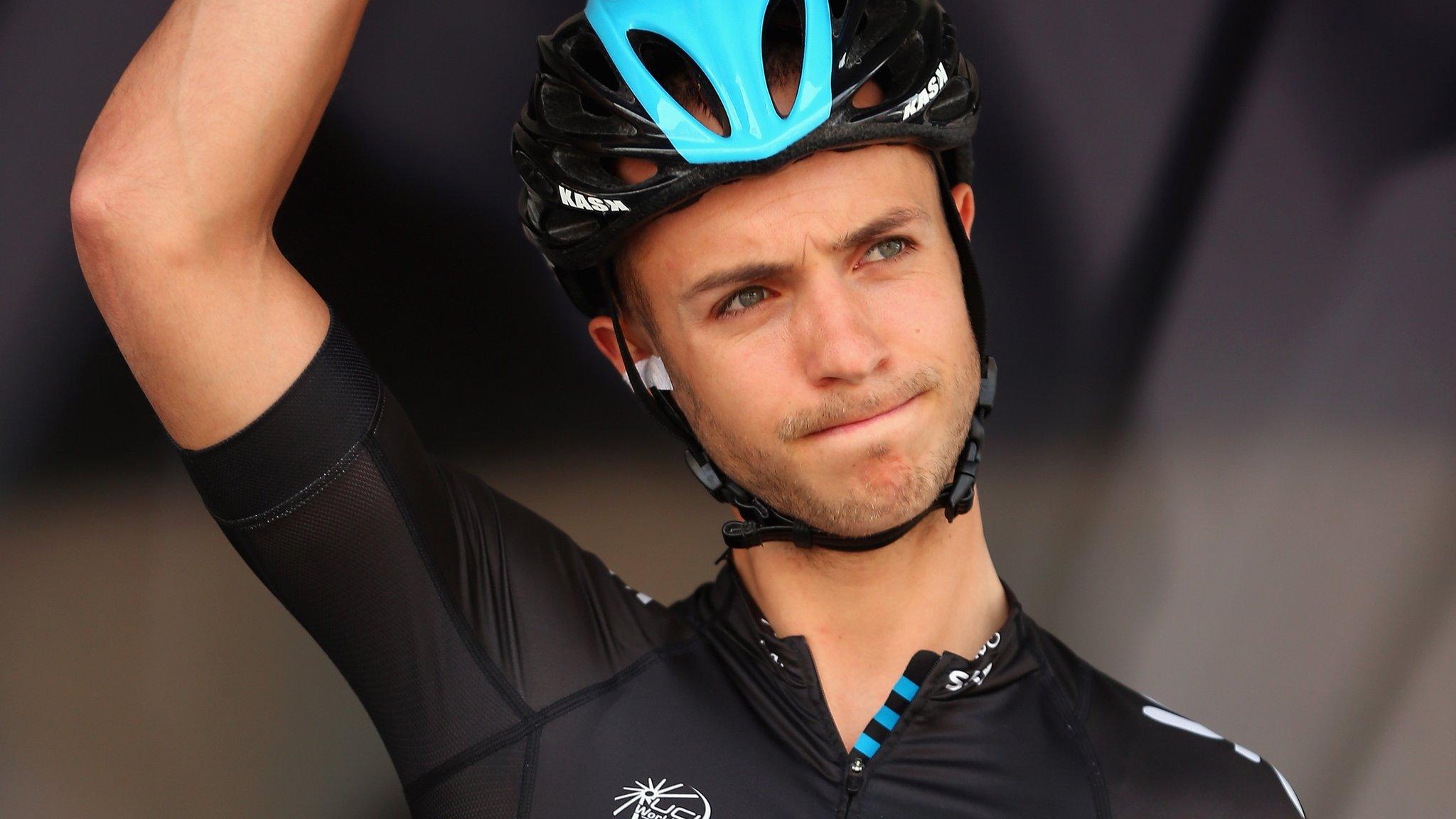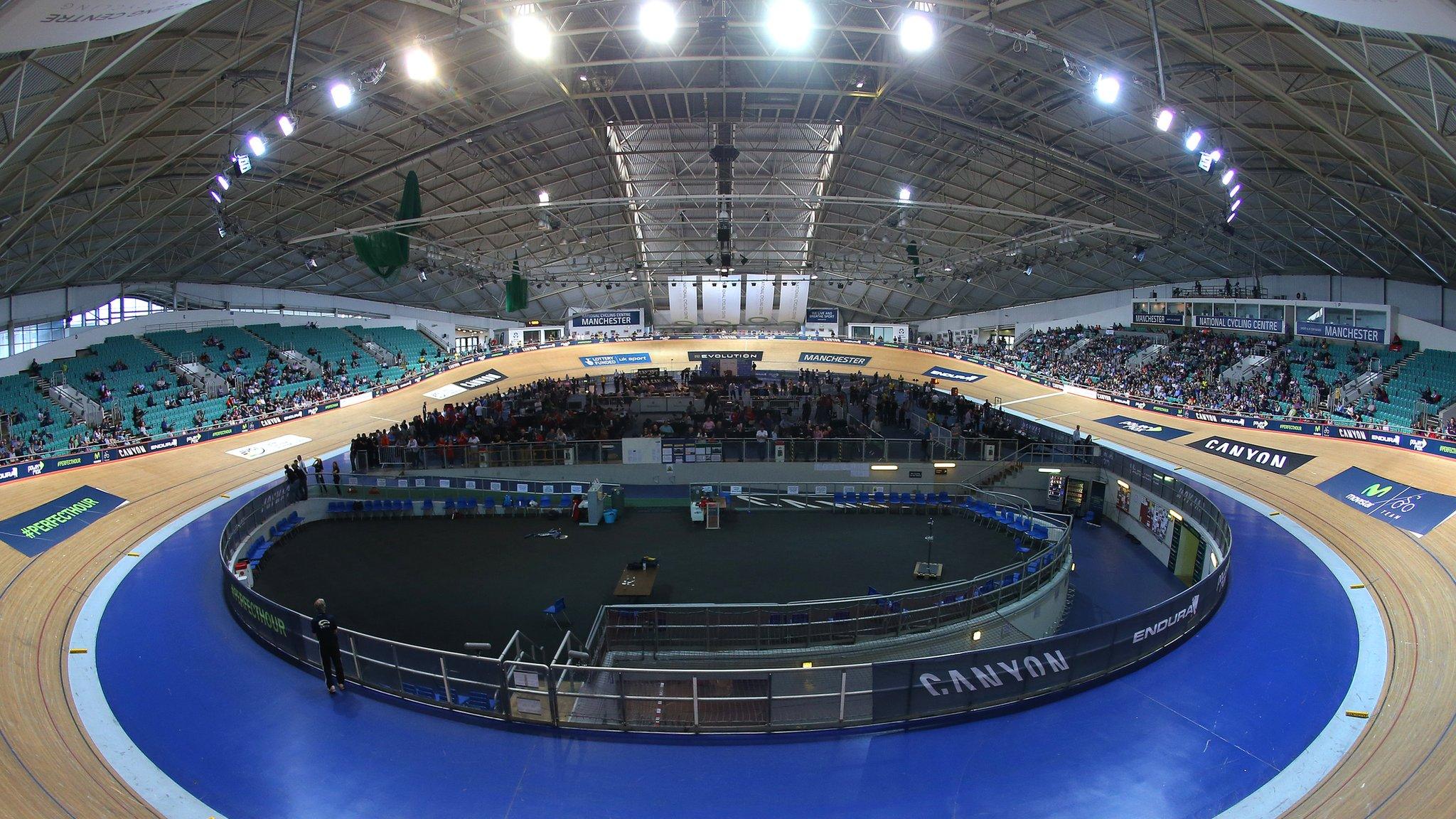Road World Championships: British cycling 'has more than titles at stake'
- Published

Yorkshire is hoping to surpass its staging of the Tour de France's Grand Depart in 2014
For British cycling, there is a lot more than titles at stake at the Road World Championships in Doha this week.
On Wednesday, the event's organisers - international federation the UCI - will announce if Yorkshire has won the right to host the 2019 edition of the sport's flagship event.
And with a UK Anti-Doping (Ukad) investigation into allegations of wrongdoing in cycling adding to the pressure on Team Sky - as well as national governing body British Cycling - victory would represent some much-needed positive news at a time of unprecedented scrutiny.
Staging the sport's most important championship outside of an Olympics for the first time since 1982 could surpass Yorkshire's spectacular hosting of the Tour de France's Grand Depart in 2014.
But this has become about a lot more than eight days of action, and the prestige of providing the final act of a decade during which Britain became accustomed to hosting global sports events.
A collaboration between tourism promoter Welcome to Yorkshire, funding agency UK Sport and British Cycling, the 2019 bid is backed by the government to the tune of £24m, including £15m of grassroots investment.
While participation has grown significantly in recent years, those in charge of the sport believe that, for success to be properly harnessed, there needs to be a major improvement in facilities and infrastructure.
Compared to European neighbours, Britain has a chronic shortage of closed road circuits, where cyclists can ride and compete safely. According to British Cycling, there has been £10m of public investment in facilities - via Sport England - since 2009. So an injection of another £15m over the next five years could be a game-changer, as the sport tries to appeal to a younger, urban-based and more diverse demographic.
Sir Gary Verity, who devised the 2019 bid, hopes that, if successful, it will lead to a fourth day being added to the annual Tour de Yorkshire, allowing for two days of women's racing.
Campaigners will also no doubt use it to reinforce efforts to persuade the Department of Transport to invest significantly more in bike lanes, especially outside of London, where levels of provision remain drastically low. Britain puts just £1 per person per year into everyday cycling, compared to about £28 in the Netherlands.
Bradley Wiggins: 'This was about putting myself back on a level playing field'
And yet, it will take more than good news on Wednesday to divert attention away from cycling's recent turbulence. Who would have thought that last month's hacking of the World Anti-Doping Agency (Wada) computer system, and the release of Sir Bradley Wiggins' medical records, would lead so quickly to Ukad officials making a surprise visit to 'the medal factory' itself - the Manchester velodrome, home of Team Sky and British Cycling?
Wiggins and Team Sky supremo Sir Dave Brailsford may have thought they had ridden out the worst of the storm that erupted over Wiggins' therapeutic use exemptions (TUEs) on medical grounds for banned steroid triamcinolone - especially when the narrative suddenly lurched towards the Daily Telegraph's undercover sting that cost Sam Allardyce his job as England football manager.
But then came former rider Jonathan Tiernan-Locke's claim to BBC Sport that British Cycling doctor Richard Freeman (the man who had signed off Wiggins' TUEs) had "freely offered" controversial painkiller tramadol at the 2012 World Championships. British Cycling says Freeman denies the claim.
Team Sky TUE stance questioned by Jonathan Tiernan-Locke
There was then an allegation in the Daily Mail that a medical delivery had been made by a British Cycling coach to Team Sky in June 2011 on the day Wiggins won the Criterium du Dauphine in La Toussuire.
There is no suggestion Wiggins has broken any rules, and he has said he welcomes the investigation. Team Sky have emphasised their belief they have done nothing wrong. Both parties insist the TUEs Wiggins received were for medical reasons and not to gain an unfair advantage. And British Cycling says it can say nothing until the inquiries are complete.
But some awkward questions remain:
What medication was in that mystery package?
Were records not kept of such dispatches?
Why did Team Sky appear so clumsy and struggle to explain it?
Was the relationship between the publicly funded governing body and the privately financed Team Sky too close?
Will Ukad's investigation be thorough enough?
And could Sky - soon to be replaced by HSBC as British Cycling's main sponsor - reconsider its multi-million pound bankrolling of the team that has transformed the country's elite cycling fortunes?
Sir Dave Brailsford was interviewed by the BBC on 26 September
Europe's largest media giant has done incredibly well out of its partnership with cycling - and says it remains fully committed to its racing team.
Graham McWilliam, chairman of the Team Sky board, felt the need to issue a statement on Monday, insisting that "with all the noise... I can assure you of Sky's full and continued support".
"There is no equivocation on our part," he added.
Started in 2010, Team Sky's aim was to win the Tour de France with a British rider. Despite a frustrating debut season, remarkably that has now been achieved four times in the past five years.
However, having pledged from the very beginning to prove that winning clean was possible, never before has Team Sky's reputation and credibility been on the line like it is now.
Brailsford has faced tricky questions before of course; about whether he made promises it was always going to be impossible to keep, if Sky was naive in proclaiming a 'zero-tolerance' policy on doping, their judgement in hiring riders and support staff who later turned out to have been involved with performance-enhancing drugs in the past, about the release of Chris Froome's power data and about declining to join the MPCC (Movement for Clean Cycling), a group of teams committed to not using corticosteroids., external
But nothing compared to the current crisis.
This has been a tumultuous few months for the sport.
In April, British Cycling had to investigate claims high-performance equipment had ended up on unofficial websites. Technical director Shane Sutton resigned after allegations of sexism and bullying towards track rider Jess Varnish and Para-cyclists. He denied the claims, but another investigation - into the culture at the national cycling centre - was launched.
British rider Simon Yates was then revealed to have tested positive for an anti-asthma drug. His Orica-GreenEdge team took "full responsibility for the mistake" and insisted there was "no wrongdoing" on Yates' part, but he was given a four-month ban in June.
And, on the eve of the Olympics, it was revealed Lizzie Deignan - formerly Armitstead - had narrowly avoided being banned after missing three doping tests in under a year, which would violate Wada's code. She won an appeal and one of the missed tests was declared void.
None of that prevented another big medal haul at Rio 2016, the six golds and 12 medals justifying the £30m of public investment it has received from UK Sport over the past four years.
Brailsford swiftly hit back at the rivals and conspiracy theorists who questioned Team GB's ability to peak when it mattered and their continued dominance in the velodrome.
But since then, dismissing the doubters has only become harder.
Brailsford: 'They've taken it to another level'
- Published9 October 2016

- Published6 October 2016

- Published8 October 2016
